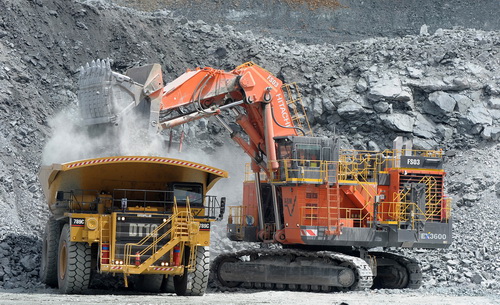Economy
Australia's super-tax on miners fails to deter Chinese investments
By Zhang Qi (China Daily)
Updated: 2010-05-05 09:06
 |
Large Medium Small |
If approved, resource tax not scheduled to start until July 2012
BEIJING - Australia's recent plan to impose a super-tax on mining groups will not deter Chinese companies from investing in that nation's mining sector, industrial insiders said.
Under the latest plan, Australia will tax miners 40 percent on profits for their operations in 2012. Revenue generated will be used to pay for infrastructure improvements, retirement fees and company reforms, the Australian government said on Sunday.
 |
|
A dump truck is loaded with iron ore at the Australian Bulk Minerals iron ore mine at Savage River in Tasmania, Australia. During the past decade, profits of Australian mining companies amounted to $74 billion. [Carla Gottgens/Bloomberg News] |
Zhang Ye, vice-general manager of China National Minerals, a wholly owned subsidiary of metals trader China Minmetals, said the proposal would not affect Chinese companies' decision to invest in Australian mining.
Analysts said Chinese companies like Chinalco and Yanzhou Coal Mining, which have already invested in local mining resources, might be affected.
Chinalco, China's largest aluminum producer, is Rio's largest shareholder with a 9.3 percent stake.
Yanzhou Coal Mining Co Ltd last year paid $2.9 billion for the acquisition of Australian Felix Resources Ltd.
Some Chinese companies complained that the Australian government doesn't have a favorable attitude toward Chinese companies investing in the nation's mines, industrial analysts said.
But that won't deter Chinese companies' from buying overseas resources, said Zhang Lin, an analyst with the Beijing-based Lange Steel Information Research Center.
Chinese companies have long wanted to invest in overseas resources to secure raw material supplies.
Zhang Ye said the Australian government would make a balanced decision between attracting overseas investments and imposing taxes from a long-term perspective.
The resources tax on Australian mining companies is scheduled to start in July 2012, and is expected to create $11.1 billion in revenue for the Australian government in the first two years.
| ||||
The tax may reduce BHP's earnings by 17 percent and Rio's by 21 percent in 2013, according to UBS AG estimates.
Some Australian mining companies are worried the move will affect future investment in the industry, making mining assets less attractive.
Iron ore company Cape Lamerber Resources on Tuesday scrapped an Australian project, citing the nation's plans for a new mining profit tax as reason, according to Reuters.
"These planned activities will no longer occur given the outcome of the Henry tax review, which is looking to impose a retention tax or a super tax on mineral projects developed in Australia," the company said in a statement.



